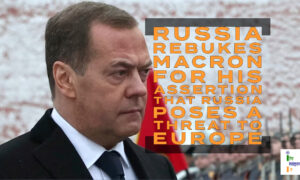
Germany labels Russia the greatest threat to Europe and warns of escalating rivalry with China.
Germany has announced its first National Security Strategy, calling Russia the biggest threat to Europe and warning about the growing rivalry with China as Beijing uses its economic might to achieve political goals.
The NSS document provides an overview of Germany’s Foreign Policy, which has shifted towards prioritizing security over economic interests in the year and a half since Russia’s invasion of Ukraine.
Unveiling the document to the media, the Chancellor of Germany – Olaf Scholz said, “This is a major change being carried out by us in Germany in how we deal with security policy.”
The document also addresses threats from climate change to supply chain disruptions. The paper outlines a plan to ensure a more cohesive cross-ministry approach to security. However, the Government could not agree on creating a National Security Council due to disagreements within Scholz’s three-way coalition over where it should be housed.
The NSS contains a slightly weaker pledge, for Germany to spend 2% of economic output on defence, as an average over a multi-year period, initially in part by using a special 100 billion euro fund created last year. This means that budget consultations for the years through to 2029 would need to be worked out again, and some projects would be postponed. Projects that result from security considerations will have priority.
Other measures in the NSS include reducing dependencies on other countries for commodities and incentivizing companies to hold strategic reserves after Germany’s over-reliance on Russia for energy brought an energy crisis last year. These measures are particularly relevant to Germany and Europe’s reliance on China for critical minerals key to the transition to a carbon-neutral economy.
China is increasingly threatening regional stability and international security as it seeks to exert its economic power to reach political goals and assert its regional hegemony.
Prior to this, the Defence Minister of Germany – Boris Pistorius said that Germany would send 2 warships to the Indo-Pacific amidst rising tensions between China and Taiwan and over the disputed South China Sea.
Germany’s decision to deploy warships to the Indo-Pacific in 2024 underscores its commitment to maintaining a rules-based international order and ensuring the security of global maritime passages. As tensions continue to escalate in the region, the actions and involvement of nations like Germany will play a crucial role in shaping the geopolitical dynamics of the Indo-Pacific and beyond.







